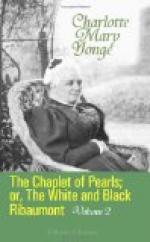CHAPTER III. THE FAMILY COUNCIL
He counsels a divorce
Shakespeare,
king Henry VIII.
In the spring of the year 1572, a family council was assembled in Hurst Walwyn Hall. The scene was a wainscoted oriel chamber closed off by a screen from the great hall, and fitted on two sides by presses of books, surmounted the one by a terrestrial, the other by a celestial globe, the first ‘with the addition of the Indies’ in very eccentric geography, the second with enormous stars studding highly grotesque figures, regarded with great awe by most beholders.
A solid oaken table stood in the midst, laden with books and papers, and in a corner, near the open hearth, a carved desk, bearing on one slope the largest copy of the ‘Bishops’ Bible’; on the other, one of the Prayer-book. The ornaments of the oaken mantelpiece culminated in a shield bearing a cross boutonnee, i.e. with trefoil terminations. It was supported between a merman with a whelk shell and a mermaid with a comb, and another like Siren curled her tail on the top of the gaping baronial helmet above the shield, while two more upheld the main weight of the chimney-piece on either side of the glowing wood-fire.
In the seat of honour was an old gentleman, white-haired, and feeble of limb, but with noble features and a keen, acute eye. This was Sir William, Baron of Hurst Walwyn, a valiant knight at Guingate and Boulogne, a statesman of whom Wolsey had been jealous, and a ripe scholar who had shared the friendship of More and Erasmus. The lady who sat opposite to him was several years younger, still upright, brisk and active, though her hair was milk-white; but her eyes were of undimmed azure, and her complexion still retained a beauteous pink and white. She was highly educated, and had been the friend of Margaret Roper and her sisters, often sharing their walks in the bright Chelsea garden. Indeed, the musk-rose in her own favourite nook at Hurst Walwyn was cherished as the gift of Sir Thomas himself.




